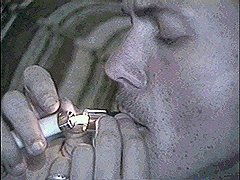
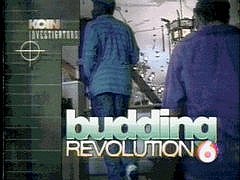 You may not realize it, but there's a revolution underway in this country right now. It's a full-throttle fight to legalize marijuana for seriously-ill people. You can understand it better by imagining that your best friend, your mother, or someone else you love is dying, or is in severe pain caused by an incapacitating illness. Now try to imagine that the only way they can get any relief at all is by taking a drug that could get them arrested. Still, it's the only thing that stops the pain. What would you do? This is the medical marijuana issue in a nutshell. Over a three- night period, KOIN-TV reporter Reed Coleman took a close look at the controversy surrounding medicinal marijuana. Coleman poked and prodded this political hot potato, giving an in-depth report on the situation in the country, and right here in the northwest.
You may not realize it, but there's a revolution underway in this country right now. It's a full-throttle fight to legalize marijuana for seriously-ill people. You can understand it better by imagining that your best friend, your mother, or someone else you love is dying, or is in severe pain caused by an incapacitating illness. Now try to imagine that the only way they can get any relief at all is by taking a drug that could get them arrested. Still, it's the only thing that stops the pain. What would you do? This is the medical marijuana issue in a nutshell. Over a three- night period, KOIN-TV reporter Reed Coleman took a close look at the controversy surrounding medicinal marijuana. Coleman poked and prodded this political hot potato, giving an in-depth report on the situation in the country, and right here in the northwest.
KOIN Investigation: Budding Revolution: The Battle Over Medicinal Marijuana aired October 30, 31, and November 1, 1997 at 6:00 p.m.
Part I: Welcome to the Cannabis Club!

They smoke it out in the open. In bowls, pipes, water bongs, and cigarettes. At the Cannabis Club in downtown San Francisco, a signed letter from your doctor is all you need in order to buy marijuana legally. You can take it home, or sit down and smoke it right there.
Ever since California voters passed Proposition 215, a measure that legalized marijuana for medical use, San Francisco has become the shangri-la for medicinal pot. While the Cannabis Club is just one of a handful of places where sick people can buy marijuana legally in this country, it's run much like any other business. Customers with doctor permission can pick and choose from a variety of different pot strains.
Dennis Peron, who helps run the Cannabis Club, said the shop is a sanctuary for many people suffering from a certain disease.
"All of them are facing some sort of life threatening illness or some kind of disability, and marijuana helps them," Peron said. "But you know they also are very lonely. They live in tiny little apartments downtown and don't have a lot of interaction. This is their sanctuary, and it's an honor for me to run this for them."
Club customers are relieved too. Most say it's much easier, and safer, to buy pot from the club than to be forced to obtain it illegally on the street. District Attorney Keith Vines is a club customer who has suffered from "Wasting Syndrome," a common problem for people infected with the AIDS virus. It stole his appetite and ate away at his body. Vines said marijuana saved his life. This comes from a man who prosecuted San Francisco's second largest drug case in history. One that confiscated 400 pounds of pot.
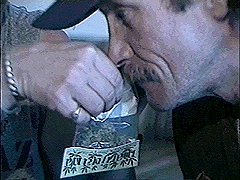
"I agree with the drug laws," Vines said. "I don't think we should legalize marijuana. But people like me and cancer patients are using marijuana because our doctors are recommending it, because we have a serious medical illness. It's meant to help us stay alive, not to get high."
In her investigation, KOIN-TV's Reed Coleman found that even in the politically-progressive climate of Northern California, this issue is still piping hot. But it spreads much further than California. All over the country, and right here at home, people are fighting for the right to buy and sell pot to help ease the pain caused by debilitating diseases like AIDS, cancer, and glaucoma.
Part II: War in the Rose City... and Beyond
Fifty-year old Diane Densmore doesn't look like your typical pot smoker, or pot dealer for that matter. But after Portland police raided her Alternative Health Center in downtown Portland this September, that's exactly what authorities believed she was. Densmore has made it her mission to sell pot to the sick people of Portland, but the police say they have a responsibility to the laws of the state, one of which says that it's illegal to smoke, buy, or sell marijuana. Densmore said that it's worth the risk.
"I make it possible for very sick people to get marijuana," Densmore said. "We're sick here and we're trying to find an alternative way to get better. This is a healing place."
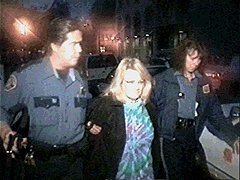 In a similar incident in October, police again led Densmore away from the clinic in handcuffs, and charged her with four felony drug counts. Investigators say Densmore gave pot to undercover officers who faked illnesses. In its investigation, authorities were led to a home in North Portland, where they arrested three men suspected of supplying the clinic with its pot.
In a similar incident in October, police again led Densmore away from the clinic in handcuffs, and charged her with four felony drug counts. Investigators say Densmore gave pot to undercover officers who faked illnesses. In its investigation, authorities were led to a home in North Portland, where they arrested three men suspected of supplying the clinic with its pot.
Densmore is one of the many people around the country who put their freedom on the line to do what they believe to be the right thing. Many doctors, both alternative and traditional, are also putting themselves in risky situations. Some, like Dr. John Stansell of the University of California at San Francisco, want the government to reconsider the pros and cons of med pot.
"I think that we as physicians bear an obligation to do what is best for our patients," Stansell said. "Part of that obligation is to have an open mind."
Many patients who need the drug to help them cope with their illnesses are at the front lines of this war, side by side with fighters like Diane Densmore. Jim Richards, a patient of the Alternative Health Center hopes someone will give the drug a chance.
"No one's out to hurt anybody or to sell to children," Richards said.
In states like California and Arizona, where med pot is legal, there are still many doctors afraid to prescribe it. What is it that they're afraid of? The ethics or the politics?
Part III: A Political Fireball
Right now, there are only eight people in this country who get marijuana from the federal government to use as medicine. There used to be a lot more people in that program, but it was dissolved in 1991, after the Public Health Service decided it went against the government's war on drugs. Across the country, and here in the northwest, doctors, patients, and politicians are finding themselves split on the issue. Some feel med pot should be decided in the political arena, while others believe the fate of sick or dying people should be kept as far away from politics as possible.
Washington's Measure 685, on the ballot this election year, would legalize marijuana and other drugs, like heroin, LSD, and peyote for medical use if it passes. If 685 passes, seriously or terminally ill patients would need a recommendation from a licensed physician to use the drugs. Critics of the measure say this is just a ploy to legalize those drugs for everyone.
In California, where med pot is legal, many doctors who recommend the drug have found themselves targets of threats by the federal government. Keith Vines, a San Francisco district attorney who uses med pot in battling AIDS, says it's all about the government trying to save face.
"It has nothing to do with the war on drugs," Vines said. "It has everything to do with politics. It has everything to do with 'Let's look tough on drugs'."
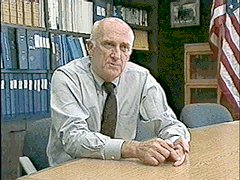 Mike Schrunk, pictured, a Portland district attorney who helped spearhead the September raid on Diane Densmore's Alternative Health Center, said the law is the law, but the line is paper-thin.
Mike Schrunk, pictured, a Portland district attorney who helped spearhead the September raid on Diane Densmore's Alternative Health Center, said the law is the law, but the line is paper-thin.
"I'm not really against medical marijuana," Shrunk said. "I'd like to see it work. But if you're going to put the word 'medical' in front of the word 'marijuana', it shouldn't be a criminal law problem. It should be a medical problem."
KOIN-TV's Reed Coleman found that most doctors and politicians who opposed med pot wouldn't' talk on the issue. They simply said that movements to legalize medical marijuana, like Washington's Measure 685, are nothing but gimmicks to legalize pot and other drugs across the board.
The campaign behind Measure 685, and similar ones in California and Arizona, have received a lot of money from some very wealthy individuals who only want to legalize drugs in America.
Next year, Oregonians will have a chance to vote on whether or not possession of less than an ounce of pot is a criminal offense. Don't be surprised if you see another measure on that ballot regarding legalization of medical marijuana.
Postscript, November 6, 1997: After The Fire
On Tuesday, November 4th, Washington's Measure 685 was soundly defeated by a margin of 20 percent. In Portland, Diane Densmore, the proprietor of the Alternative Health Center, was put in jail again at the end of October, charged on 14 counts of drug distribution. Densmore managed to pay her bail of $460,000 on November 5, 1997. She was arraigned on four additional drug charges in the Multnomah County Courthouse on November 6,1997. Keep an eye on KOIN-TV and Channel 6000 for the latest on Diana Densmore.
If you're looking for more on the battle over medicinal marijuana in America, take a look at these websites:
Legalization of medicinal marijuana - http://www.unc.edu/~rkizakev/research.html
The legal movement in Washington state - http://www.mpp.org/WAstate.html
The National Organization for the Reform of Marijuana Laws (NORML) - http://www.norml.org/
A report from the National Institute of Health (NIH) - http://www.ama-assn.org/sci-pubs/journals/archive/jama/vol_278/no_10/jmn71117.htm
The Virtual Buyer's Club: Growing your own - http://www.interactve.com/medicalmarijuana/
Compiled by Channel 6000 Staff
[End]
Send a letter to the news editor of KOIN
 to the All Politics Is Local page.
to the All Politics Is Local page.
This URL: http://www.pdxnorml.org/KOIN_revolution_103097.html